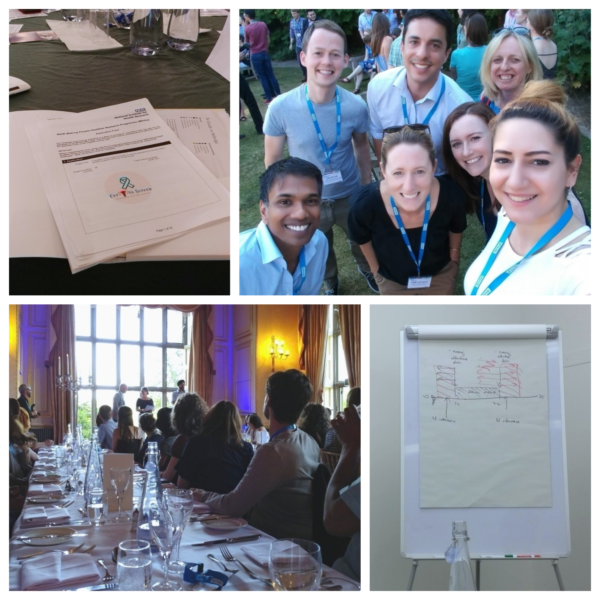The NIHR Infrastructure Doctoral Training Camp: What a Way to Learn
In July of this year, I was one of the two NIHR Manchester BRC trainees to be selected to attend the 3-day NIHR Infrastructure Doctoral Training Camp at Ashridge House.
This year’s focus was on attracting further research funding and as a first year basic science PhD student, I was very intrigued to learn more about this fundamental aspect of my future career.
What to expect from the camp?
Looking at the agenda, I was aware that the camp was going to be a tough, but I didn’t expect how much I was going to enjoy my time there! The camp is primarily aimed at PhD students and, aside from the group exercise; it involved a poster or oral presentation as well as a chance for networking. It was great to see what other trainees have been working on across the other NIHR institutions.
We spent the first day with presentations from attendees as well as senior speakers who gave invaluable insight and advice including how to build a fruitful post-doctoral career. The talk that caught most of my attention was the one by a duo of a Public and Patient Involvement (PPI) advisor and manager. Although I am actively involved in PPI/E and am very much aware of the importance of it, it was surely brilliant to see how NIHR and related institutions hold this at their core.
Following the talks, we were each assigned to groups of seven with a mentor to provide advice during the camp. This year’s task was to write and submit a funding application complete with a grant proposal, PPI section, plain English summary, research team details, finances (max £350,000) and a five minute presentation. Although the application deadline was 5pm the next day, we weren’t allowed to start working until day two, apart from discussing our topic.
Discovering your potential
Funding applications generally give most researchers goose bumps, if not all. So, we had a tough job ahead of us. Each one of us had a completely different background (basic scientists, doctors, qualitative researchers and more) and at the end of the camp, that reiterated how important the multidisciplinary nature of research is. Although I am used to working as part of a team, both during my PhD and previous jobs, this was a new experience for me.
Not surprisingly, it took us a while to choose our topic but after an hour or so of debate, we agreed on:

“improving attendance to cervical cancer screening appointments by young women through a targeted social media campaign”
My current research is focused on early detection and prevention of endometrial cancer and so, I felt an instant connection despite the research methodology being completely new to me.
Under pressure
The second day started with a talk on how to craft a good funding application and after this, we were ready to jump right into work.
While dividing responsibilities, we got the news that the deadline for submitting plain English summary was taken forward to 12pm! Talk about working under pressure…
While some of the team focused their attention on preparing the lay summary (without having the background research just yet!), some of us started attending 10 minute meetings with the directors of science and finance, qualitative and quantitative advisors and PPI representative.
One minute I was searching for background information, the next I was running to make it to a workshop on presentation skills for panel interviews, and running back to make it to my meeting with a quantitative advisor. Incredibly, we managed to get everything ready by the deadline and submitted our application and presentation, with only seconds to spare.
We were given all the essential tools and guidance to make this happen!
I could not believe that the whole process that we dread so much was crammed into only a third of a day. To ensure it was realistic the organisers had included last minute pitfalls and hurdles, such as the proposal needing to be approved and signed off by the director. I’m almost certain no that every group had to make changes before it was signed off!
The work didn’t end with the submissions though, as next step was a presentation. Our group decided to stay longer and prepare for the presentation next day. We went for a quick drink at the bar followed by a formal dinner where the winners of the earlier oral and poster presentations were announced.
The road to success
I think we all had high hopes and a sense of trust in our proposal, but we still had no idea what other groups have prepared. As we sat there watching each group presentation, followed by tough questions, comments and rigorous discussions between the other groups and the funding committee, I felt the tension kicking in.
Then, before I knew, it was the time for us, the Ash Rangers to present. Our presenter Richard did a great job, and we joined him for the panel questions which ranged from “why even bother?” to “explain this and that in detail”.
After the last group presented and survived further questioning, the panel was ready to announce the winners, the pinnacle of an intense few days.
There was a few seconds gap between the announcement of our group’s name and us processing what we actually heard. Our proposal was one of the winning applications, “highly commended” to be exact! Our fantastic mentor Dr Channa Jayasena was more than delighted to hear the news just like the rest of us. As much as it was important for us to win, apparently there was an ongoing competition between the mentors, albeit at a friendly level.
Is it really worth?
Absolutely! It was as intense as it gets but certainly a once in a lifetime experience, that has given me valuable skills for the future. It’s mind-blowing to see how much you can achieve in such a short time with the right guidance and real effort.
I’ve come away less afraid and more confident to take on the challenges of an academic/scientific career. Aside from the learning experience, I made great connections and enjoyed spending time at the truly picturesque Ashridge House.
